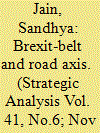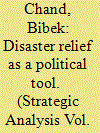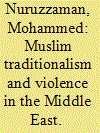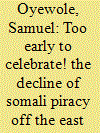| Srl | Item |
| 1 |
ID:
155879


|
|
|
| 2 |
ID:
155874


|
|
|
|
|
| Summary/Abstract |
In the aftermath of the 2015 earthquakes in Nepal, China and India immediately sent relief teams. The relief efforts in Nepal showcase a competitive aspect of the two major regional powers, as China seeks to gradually increase its influence in South Asia. This article analyses how these two governments utilised relief efforts to increase influence in Nepal, within the wider context of the contentious Sino–Indian relationship. The Chinese and Indian relief responses after the Nepal earthquakes are extrapolated to assess their strategic utility.
|
|
|
|
|
|
|
|
|
|
|
|
|
|
|
|
| 3 |
ID:
155876


|
|
|
|
|
| Summary/Abstract |
Korea’s rapid economic transformation from being one of the poorest countries during the 1950s to becoming a member of the Organisation of Economic Co-operation and Development (OECD) in 1996 surprised the world, and is often considered the ‘Miracle on the Han River’. Within a period of a few decades, Korea became an economic powerhouse and one of the largest producers and exporters of steel, ships, automobiles, cell phones, etc. In recent years Hallyu or the ‘Korean Wave’ has taken the world by surprise. The term basically refers to the popularity of Korean cultural products such as Korean music, dance, dramas, movies, food, fashion, cosmetics, etc. across Asia and other parts of the world. The cultural industries have become one of the new engines of economic growth in Korea, and have been generating billions of dollars for this export-dependent country. The Korean Government has been playing an important role in the promotion of these cultural industries through cultural diplomacy. However, one country which has remained the least affected by the Korean Wave is India. Barring some areas in the north-eastern part of India where it has made some impact, the rest of the country largely remains unaware of this phenomenon. In recent years, the Korean Government has been making efforts for the promotion of the Korean Wave in India. This article analyses Korea’s cultural diplomacy efforts to spread the Korean Wave in India.
|
|
|
|
|
|
|
|
|
|
|
|
|
|
|
|
| 4 |
ID:
155877


|
|
|
| 5 |
ID:
155878


|
|
|
| 6 |
ID:
155875


|
|
|
|
|
| Summary/Abstract |
This article analyses the history of the United Nations Security Council (UNSC) reform with a particular focus on India’s aspiration and attempts to become a permanent member on the Council. The primary objectives of this historical examination are to appreciate how hard reforming the UNSC is and to understand how challenging it will be for India to acquire a permanent seat on the Council. Probing the General Assembly debates on UNSC reform, the article exposes the fundamental hurdles to change, the duplicity of the permanent five (P-5) and lack of unity among the stakeholders. Accordingly, the article aims to contribute to future strategies and policies of UNSC reforms.
|
|
|
|
|
|
|
|
|
|
|
|
|
|
|
|